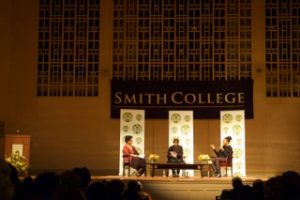The Meridians, a feminist and interdisciplinary journal, hosted a dialogue Friday, October 14 on the Black Lives Matter Movement in John M. Greene Hall as the keynote event of the symposium “When and Where I Enter.” The event was co-sponsored by the Center for Religious and Spiritual Life along with the Smith College President’s Office, Africana Studies, Program for the Study of Women and Gender, and nearly 19 other co-sponsors. Leaders of the Black Lives Matter movement, Janaya Khan and Opal Tometi, joined University of Illinois at Chicago Professor of African American Studies, Gender and Women’s Studies, and History Barbara Ransby to discuss feminism, race, transnationalism and many other topics that relate to the Black Lives Matter movement.
 Ada Comstock Scholar and Government major at Smith, Arianna Collins, and Paula Giddings, a professor of Africana Studies at Smith and editor of Meridians, introduced the speakers. Khan, Tometi, and Ransby all sat down on the stage and the conversation began. The dialogue was structured as a question and answer, opening generally with, “How do you see the movement at this point?”
Ada Comstock Scholar and Government major at Smith, Arianna Collins, and Paula Giddings, a professor of Africana Studies at Smith and editor of Meridians, introduced the speakers. Khan, Tometi, and Ransby all sat down on the stage and the conversation began. The dialogue was structured as a question and answer, opening generally with, “How do you see the movement at this point?”
Khan then expanded upon Tometi’s remarks and explained that the Black Lives Matter movement is not only about police but is rather about “fighting for the quality of black lives.” She explained the many facets of the movement, referencing The Movement for Black Lives and the production of what Khan refers to as “the document” which lays out the wider positions, policies, and goals of the movement. Khan, who is an International Ambassador for the Black Lives Matter movement, also addressed the global nature of the movement. Tometi contributed to Khan’s remarks in pointing out “black people are catching hell all over the world.”
The Center for Religious and Spiritual Life was glad to have an opportunity to support the Black Lives Matter Movement through co-sponsorship. Interim Director of Religious and Spiritual Life, Matilda Cantwell, noted, “one of the goals of the Center for Religious and Spiritual Life is to support social movements that intersect with Center goals.” Indeed, on September 29, a vigil was coordinated by the Center for Religious and Spiritual Life and Office for Institutional Diversity and Equity to honor the black lives that have been lost in encounters with law enforcement. Cantwell made the following remark regarding the vigil, “when we vigil we refuse to be implicit in business as usual; we invite in the winds of change, which are blowing. But yet, friends, we know, not soon, not strong, not fast enough” which echoes the call to action Tometi and Khan concluded with.
The decentralized, yet organized and far reaching nature of the Black Lives Matter movement was something I admittedly had not fully understood until that evening. It is incredible to see these issues from a global perspective and yet appreciate the grassroots power behind this movement. Still, there is much more to be done that goes beyond writing a Facebook post with #BLM. Tometi calls for “deliberate action together” to improve the quality of black lives in the U.S., Toronto, Haiti, Columbia, and all over the world.
Nearly two hours later, the conversation concluded with a reference to the eloquent remarks of Alice Walker, “keep in mind always the present you are constructing. It should be the future you want.”
